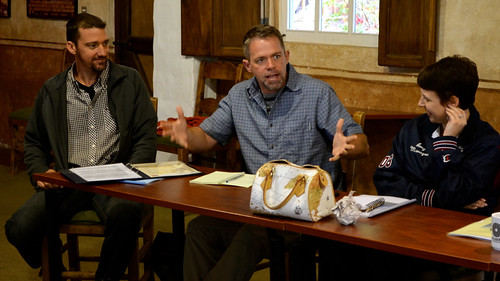For the past five years, travel has been one of my top priorities. I’ve made a habit of taking two major international trips each year. This year was no exception. In 2013, I visited six other countries (three for the first time). I also got a chance for first visits to several states.
January
In early January, I flew to Houston, Texas to visit with Toni and Amy. Toni and I spent three days giving Amy advice about blogging and marketing. In turn, Amy and her husband treated us to great meals and good wine.
 Toni snaps a photo of her 40th birthday dessert
Toni snaps a photo of her 40th birthday dessertWhen I returned from my trip to Texas, I embarked upon a one-month detox in which I consumed no alcohol, no caffeine, and very little sugar. My body was grateful.
February
I didn’t travel in February, but I did move house. After a year in an apartment, I bought a lovely condo in a popular Portland neighborhood.
 Becca, Baker, and Kim helping with the move…
Becca, Baker, and Kim helping with the move…Moving in was an adventure. Not quite a vacation, I guess, but still fun.
March
In late March, Kim and I took our first long trip together. We started with a week in Paris, France. We ate a lot of cheese and drank a lot of wine. Because Kim was still recovering from shoulder surgery, we didn’t do anything too adventurous, but we had fun.
 Wine and cheese in France…
Wine and cheese in France…
After our week in France, we took the train to London, where we rented a car and headed out into the countryside with no plans. We spent a couple of days driving through the beautiful hills and valleys near Bath and Coventry.
Then we drove north through the Lake District and on into Scotland. In cold, cold Edinburgh, we were delighted by the warmth of the people, especially Frank, a friend of a friend. Frank and his family showed us around the city.
 Whisky and cheese in Scotland…
Whisky and cheese in Scotland…After four days in Scotland, we had a marathon day of driving (while both of us were sick!) to reach London’s Gatwick airport and our flight to Norway.
April
Our trip continued with four nights in Oslo and Bergen, where we joined Chris Guillebeau’s “End of the World” party.
Touring the Viking Museum in Oslo…
We had a good time in Norway, but were glad to escape the high prices and return to London, where we spent four days experiencing everything the city had to offer.
After three weeks on the road, we flew home, rested and happy.
May
During the month of May, my only escape was for two nights in central Oregon’s Sunriver Resort, where Kim and I joined some friends for an annual weekend away.
June
June was filled with quick getaways. First, Kim and I spent two nights at the Allison Inn and Spa in Newberg, Oregon. We drove around wine country, got massages, and generally just relaxed.
Then I flew to Cincinnati, Ohio (by way of northern Kentucky) for two days at the Savvy Blogging Summit. Finally, we spent three days in Groveland, California (outside Yosemite National park) to celebrate the birth of Kim’s new nephew, Porter.
The weather was hot, so we spent an afternoon cooling off underneath a waterfall.
After we flew home, I jumped right into work for the third-annual World Domination Summit, which was a smashing success.
July
I didn’t travel in July, but spent the month reorganizing my life in preparation for new projects. Plus, Kim moved into the condo with me.
August
At the start of August, Kim and I drove to Boise to visit her father. The highlight of the trip was an afternoon float down the Boise River.
Also in August, we spent a weekend on the Oregon Coast for the wedding of one of Kim’s colleagues.
After three relaxing days at the beach, we drove north to catch a seven-day Alaskan cruise. On the boat, we ate and drank too much. Off the boat, we explored the Alaskan wilderness, including an amazing trip into the heart of a melting glacier.
No joke. This was one of the highlights of my life.
When we returned from the cruise, I had two days to pack before my next trip.
September
I spent most of September in Ecuador. First, I flew to Quito, where I spent ten days participating in a retreat about wealth and happiness.
 Pete and Amy look on raptly as I share some brilliant insight…
Pete and Amy look on raptly as I share some brilliant insight…When work was finished, I fulfilled a life-long ambition: I spent five days in and among the Galápagos Islands. The experience was magical.
 Everywhere you go on the Galápagos, there are sea lions.
Everywhere you go on the Galápagos, there are sea lions.After nearly three weeks away, I flew home to resume work on a couple of big projects.
October
In mid-October, I spent three nights in St. Louis, Missouri for the third annual Financial Blogger Conference. This year, I acted as emcee, which gave me a chance to practice my speaking skills while taking some pressure off conference organizer Philip Taylor. This was the best Fincon yet.
At the end of October, Kim and I took a spontaneous 24-hour vacation to Hood River, which lies just an hour east of Portland. I’d never explored the area. Turns out it’s actually pretty darn fun — a great place for a quick escape.
Hanging out in Hood River…
November
During the first weekend in November, we drove to Coeur d’Alene in northern Idaho, where we spent three nights at the Coeur d’Alene Resort. The tourist season had ended and it was very cold, so there wasn’t a lot to do. We explored the town anyhow, and enjoyed a tour of the hotel’s vast wine collection.
Exploring the wine cellars at the Coeur d’Alene Resort…
December
For Christmas, we flew to Bigfork, Montana, a small town on the edge of Glacier National Park. There we enjoyed the hospitality of extended family. We slept a lot and took daily walks in the snow.
Hiking to cut our Christmas tree…
Summary
By my count (which, admittedly, may be a little off), here’s how much time I spent away from home last year (not counting nights at Kim’s place). Bold indicates a new state or country for me.
- Other Oregon locations — 7 nights
- Texas — 3 nights
- California — 3 nights
- Ohio — 2 nights
- Idaho — 6 nights
- Missouri — 5 nights
- Montana — 6 nights
- Alaska — 5 nights
- Washington — 1 night
- Canada — 1 night
- France — 7 nights
- England — 7 nights
- Scotland — 4 nights
- Norway — 4 nights
- Ecuador — 16 nights
That’s seven nights around Oregon, 31 nights in eight other U.S. states (including the entire Pacific Northwest!), and 39 nights abroad, for a total of 77 nights away from home. I spent roughly one-fifth of my time sleeping in strange beds this year. (Thus the reason I’m reluctant to commit to things like pets or location-dependent work!)
2014
Next year, it’s unlikely that I’ll travel as much. For one, I’m trying to save money. For another, I want to focus more on work. Also, I want to get into more of routine here at home. Still, I plan to make a return trip to Ecuador (with Kim) in the summer. Plus, I’ll make at least three trips to California in 2014, will visit Hawaii for the first time, will probably make a short visit to New York, and will get an introduction to New Orleans, Louisiana!
Travel remains a priority for me, and 2015 may see some of my biggest adventures yet. But I’ll admit: I’m looking forward to a bit more stability in the year ahead.











